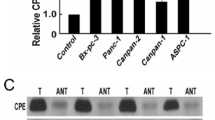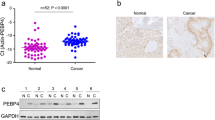Abstract
This study aimed to investigate the effects of desumoylating isopeptidase 2 (DESI2) on tumor cell proliferation, apoptosis and invasion of pancreatic cancer, and to assess the signaling pathway involved. Overexpression and silence of DESI2 were designed and the experiments were divided into 5 groups: a normal control group, an interference control group (shRNA-NC); an interference group (sh-DESI2); an overexpression control group (NC), an overexpression group (DESI2). Quantitative real time polymerase chain reaction (qRT-PCR) was used to screen the appropriate interference sequence. The silencing and overexpression of DESI2 were confirmed by qRT-PCR and western blotting. Cell cycling, apoptosis, invasion, and the expression of phosphatidylinositol-3-kinase (PI3K)-protein kinase B (AKT)-mammalian target of rapamycin (mTOR) pathway and caspase 3 were measured. Overexpression and silence of DESI2 were successfully designed in two pancreatic cancer cells, and the interference effect of sh-DESI2–3 showed the best silencing effects. The biological activities of DESI2 were detected in both ASPC-1 and PANCE-1 cells. Our results showed that cell proliferation was significantly increased in the sh-DESI2 group, while decreased in DESI2 group compared with the control group in both cell lines. In ASPC-1 cells, the events in G1 phase decreased and in S phase increased obviously in the sh-DESI2 group, compared with control group. An opposite result was found when DESI2 was overexpressed. In PANCE-1 cells, the events in G2 phase were higher in the sh-DESI2 group, while in the DESI2 group was significantly lower than that in control group. In ASPC-1 and PANCE-1 cells, sh-DESI2 group showed decreased apoptosis, increased cell invasion and increased expression of AKT, p-Akt, PI3K, p-PI3K, p-mTOR and mTOR and decreased caspase 3 expression compared with the control group, while overexpression of DESI2 leaded to increased apoptosis, decreased cell invasion and reduced expression of AKT, p-Akt, PI3K, p-PI3K, p-mTOR and mTOR and increased expression of caspase 3. DESI2 regulates the proliferation and apoptosis of pancreatic cancer cells through PI3K/AKT/mTOR signaling pathway.








Similar content being viewed by others
References
Seipel AH, Wiklund F, Wiklund NP, Egevad L (2013) Histopathological features of ductal adenocarcinoma of the prostate in 1,051 radical prostatectomy specimens. Virchows Arch 462(4):429–436. https://doi.org/10.1007/s00428-013-1385-5
Lin C, Yan H, Yang J, Li L, Tang M, Zhao X, Nie C, Luo N, Wei Y, Yuan Z (2017) Combination of DESI2 and IP10 gene therapy significantly improves therapeutic efficacy against murine carcinoma. Oncotarget 8(34):56281–56295. https://doi.org/10.18632/oncotarget.17623
Shen CC, Cui XY, He Y, Kang YH, Yi C, Yang JL, Gou LT (2015) High phosphorylation status of AKT/mTOR signal in DESI2-reduced pancreatic ductal adenocarcinoma. Pathol Oncol Res 21(2):267–272. https://doi.org/10.1007/s12253-014-9817-3
Von Hoff DD, Ervin T, Arena FP, Chiorean EG, Infante J, Moore M, Seay T, Tjulandin SA, Ma WW, Saleh MN, Harris M, Reni M, Dowden S, Laheru D, Bahary N, Ramanathan RK, Tabernero J, Hidalgo M, Goldstein D, Van Cutsem E, Wei X, Iglesias J, Renschler MF (2013) Increased survival in pancreatic cancer with nab-paclitaxel plus gemcitabine. N Engl J Med 369(18):1691–1703. https://doi.org/10.1056/NEJMoa1304369
Janku F, Wheler JJ, Westin SN, Moulder SL, Naing A, Tsimberidou AM, Fu S, Falchook GS, Hong DS, Garrido-Laguna I, Luthra R, Lee JJ, Lu KH, Kurzrock R (2012) PI3K/AKT/mTOR inhibitors in patients with breast and gynecologic malignancies harboring PIK3CA mutations. J Clin Oncol Off J Am Soc Clin Oncol 30(8):777–782. https://doi.org/10.1200/JCO.2011.36.1196
Zhu G, Liu Y, Wang Y, Bi X, Baudry M (2015) Different patterns of electrical activity lead to long-term potentiation by activating different intracellular pathways. J Neurosci 35(2):621–633. https://doi.org/10.1523/JNEUROSCI.2193-14.2015
Li J, Yang S, Zhu G (2017) Postnatal calpain inhibition elicits cerebellar cell death and motor dysfunction. Oncotarget 8(50):87997–88007. https://doi.org/10.18632/oncotarget.21324
Lastwika KJ, Wilson W 3rd, Li QK, Norris J, Xu H, Ghazarian SR, Kitagawa H, Kawabata S, Taube JM, Yao S, Liu LN, Gills JJ, Dennis PA (2016) Control of PD-L1 expression by oncogenic activation of the AKT-mTOR pathway in non-small cell lung Cancer. Cancer Res 76(2):227–238. https://doi.org/10.1158/0008-5472.CAN-14-3362
Li J, Liang X, Yang X (2012) Ursolic acid inhibits growth and induces apoptosis in gemcitabine-resistant human pancreatic cancer via the JNK and PI3K/Akt/NF-kappaB pathways. Oncol Rep 28(2):501–510. https://doi.org/10.3892/or.2012.1827
Zhu G, Wang X, Wu S, Li Q (2012) Involvement of activation of PI3K/Akt pathway in the protective effects of puerarin against MPP+−induced human neuroblastoma SH-SY5Y cell death. Neurochem Int 60(4):400–408. https://doi.org/10.1016/j.neuint.2012.01.003
Strausberg RL, Feingold EA, Grouse LH, Derge JG, Klausner RD, Collins FS, Wagner L, Shenmen CM, Schuler GD, Altschul SF, Zeeberg B, Buetow KH, Schaefer CF, Bhat NK, Hopkins RF, Jordan H, Moore T, Max SI, Wang J, Hsieh F, Diatchenko L, Marusina K, Farmer AA, Rubin GM, Hong L, Stapleton M, Soares MB, Bonaldo MF, Casavant TL, Scheetz TE, Brownstein MJ, Usdin TB, Toshiyuki S, Carninci P, Prange C, Raha SS, Loquellano NA, Peters GJ, Abramson RD, Mullahy SJ, Bosak SA, McEwan PJ, McKernan KJ, Malek JA, Gunaratne PH, Richards S, Worley KC, Hale S, Garcia AM, Gay LJ, Hulyk SW, Villalon DK, Muzny DM, Sodergren EJ, Lu X, Gibbs RA, Fahey J, Helton E, Ketteman M, Madan A, Rodrigues S, Sanchez A, Whiting M, Madan A, Young AC, Shevchenko Y, Bouffard GG, Blakesley RW, Touchman JW, Green ED, Dickson MC, Rodriguez AC, Grimwood J, Schmutz J, Myers RM, Butterfield YS, Krzywinski MI, Skalska U, Smailus DE, Schnerch A, Schein JE, Jones SJ, Marra MA, Mammalian Gene Collection Program T (2002) Generation and initial analysis of more than 15,000 full-length human and mouse cDNA sequences. Proc Natl Acad Sci U S A 99(26):16899–16903. https://doi.org/10.1073/pnas.242603899
Yan F, Ruan XZ, Yang HS, Yao SH, Zhao XY, Gou LT, Ma FX, Yuan Z, Deng HX, Wei YQ (2010) Identification, characterization, and effects of Xenopus laevis PNAS-4 gene on embryonic development. J Biomed Biotechnol 2010:134764–134769. https://doi.org/10.1155/2010/134764
Yan F, Gou L, Yang J, Chen L, Tong A, Tang M, Yuan Z, Yao S, Zhang P, Wei Y (2009) A novel pro-apoptosis gene PNAS4 that induces apoptosis in A549 human lung adenocarcinoma cells and inhibits tumor growth in mice. Biochimie 91(4):502–507. https://doi.org/10.1016/j.biochi.2008.12.002
Yuan Z, Guo W, Yang J, Li L, Wang M, Lei Y, Wan Y, Zhao X, Luo N, Cheng P, Liu X, Nie C, Peng Y, Tong A, Wei Y (2015) PNAS-4, an early DNA damage response gene, induces S phase arrest and apoptosis by activating checkpoint kinases in lung Cancer cells. J Biol Chem 290(24):14927–14944. https://doi.org/10.1074/jbc.M115.658419
Li L, Chen DB, Lin C, Cao K, Wan Y, Zhao XY, Nie CL, Yuan Z, Wei YQ (2013) hPNAS-4 inhibits proliferation through S phase arrest and apoptosis: underlying action mechanism in ovarian cancer cells. Apoptosis 18(4):467–479. https://doi.org/10.1007/s10495-012-0797-z
Roy SK, Srivastava RK, Shankar S (2010) Inhibition of PI3K/AKT and MAPK/ERK pathways causes activation of FOXO transcription factor, leading to cell cycle arrest and apoptosis in pancreatic cancer. J Mol Signal 5:10. https://doi.org/10.1186/1750-2187-5-10
Yuan Z, Yan F, Wang YS, Liu HY, Gou LT, Zhao XY, Lai ST, Deng HX, Li J, Ding ZY, Xiong SQ, Kan B, Mao YQ, Chen LJ, Wei YQ, Zhao X (2009) PNAS-4, a novel pro-apoptotic gene, can potentiate antineoplastic effects of cisplatin. Cancer Chemother Pharmacol 65(1):13–25. https://doi.org/10.1007/s00280-009-0998-5
Qi X, Song X, Liu P, Yi T, Li S, Xie C, Zheng Y, Bai Y, Sun C, Wei Y, Zhao X (2011) Antitumor effects of PLGA nanoparticles encapsulating the human PNAS-4 gene combined with cisplatin in ovarian cancer. Oncol Rep 26(3):703–710. https://doi.org/10.3892/or.2011.1337
Hou S, Zhao Z, Yan F, Chen X, Deng H, Chen X, Wang Y, Wei Y (2009) Genetic transfer of PNAS-4 induces apoptosis and enhances sensitivity to gemcitabine in lung cancer. Cell Biol Int 33(3):276–282. https://doi.org/10.1016/j.cellbi.2008.11.014
Yuan Z, Liu H, Yan F, Wang Y, Gou L, Nie C, Ding Z, Lai S, Zhao Y, Zhao X, Li J, Deng H, Mao Y, Chen L, Wei Y, Zhao X (2009) Improved therapeutic efficacy against murine carcinoma by combining honokiol with gene therapy of PNAS-4, a novel pro-apoptotic gene. Cancer Sci 100(9):1757–1766. https://doi.org/10.1111/j.1349-7006.2009.01242.x
Flanagan L, Meyer M, Fay J, Curry S, Bacon O, Duessmann H, John K, Boland KC, McNamara DA, Kay EW, Bantel H, Schulze-Bergkamen H, Prehn JH (2016) Low levels of Caspase-3 predict favourable response to 5FU-based chemotherapy in advanced colorectal cancer: Caspase-3 inhibition as a therapeutic approach. Cell Death Dis 7:e2087. https://doi.org/10.1038/cddis.2016.7
Baharara J, Ramezani T, Divsalar A, Mousavi M, Seyedarabi A (2016) Induction of apoptosis by green synthesized gold nanoparticles through activation of Caspase-3 and 9 in human cervical Cancer cells. Avicenna J Med Biotechnol 8(2):75–83
Dolka I, Krol M, Sapierzynski R (2016) Evaluation of apoptosis-associated protein (Bcl-2, Bax, cleaved caspase-3 and p53) expression in canine mammary tumors: an immunohistochemical and prognostic study. Res Vet Sci 105:124–133. https://doi.org/10.1016/j.rvsc.2016.02.004
Xu Z, Zhang F, Bai C, Yao C, Zhong H, Zou C, Chen X (2017) Sophoridine induces apoptosis and S phase arrest via ROS-dependent JNK and ERK activation in human pancreatic cancer cells. J Exp Clin Cancer Res 36(1):124. https://doi.org/10.1186/s13046-017-0590-5
Cheng X, Wang B, Jin Z, Ma D, Yang W, Zhao R, Jing X, Shen B, Peng C, Qiu W (2016) Pseudomonas aeruginosa-mannose-sensitive hemagglutinin inhibits pancreatic cancer cell proliferation and induces apoptosis via the EGFR pathway and caspase signaling. Oncotarget 7(47):77916–77925. https://doi.org/10.18632/oncotarget.12844
Chiu TL, Su CC (2017) Tanshinone IIA increases protein expression levels of PERK, ATF6, IRE1alpha, CHOP, caspase3 and caspase12 in pancreatic cancer BxPC3 cellderived xenograft tumors. Mol Med Rep 15(5):3259–3263. https://doi.org/10.3892/mmr.2017.6359
Castel P, Toska E, Zumsteg ZS, Carmona FJ, Elkabets M, Bosch A, Scaltriti M (2014) Rationale-based therapeutic combinations with PI3K inhibitors in cancer treatment. Mol Cell Oncol 1(3):e963447. https://doi.org/10.4161/23723548.2014.963447
Wang MC, Jiao M, Wu T, Jing L, Cui J, Guo H, Tian T, Ruan ZP, Wei YC, Jiang LL, Sun HF, Huang LX, Nan KJ, Li CL (2016) Polycomb complex protein BMI-1 promotes invasion and metastasis of pancreatic cancer stem cells by activating PI3K/AKT signaling, an ex vivo, in vitro, and in vivo study. Oncotarget 7(8):9586–9599. https://doi.org/10.18632/oncotarget.7078
Shimizu T, Tolcher AW, Papadopoulos KP, Beeram M, Rasco DW, Smith LS, Gunn S, Smetzer L, Mays TA, Kaiser B, Wick MJ, Alvarez C, Cavazos A, Mangold GL, Patnaik A (2012) The clinical effect of the dual-targeting strategy involving PI3K/AKT/mTOR and RAS/MEK/ERK pathways in patients with advanced cancer. Clin Cancer Res 18(8):2316–2325. https://doi.org/10.1158/1078-0432.CCR-11-2381
Gao N, Flynn DC, Zhang Z, Zhong XS, Walker V, Liu KJ, Shi X, Jiang BH (2004) G1 cell cycle progression and the expression of G1 cyclins are regulated by PI3K/AKT/mTOR/p70S6K1 signaling in human ovarian cancer cells. Am J Physiol Cell Physiol 287(2):C281–C291. https://doi.org/10.1152/ajpcell.00422.2003
Liu CY, Hu MH, Hsu CJ, Huang CT, Wang DS, Tsai WC, Chen YT, Lee CH, Chu PY, Hsu CC, Chen MH, Shiau CW, Tseng LM, Chen KF (2016) Lapatinib inhibits CIP2A/PP2A/p-Akt signaling and induces apoptosis in triple negative breast cancer cells. Oncotarget 7(8):9135–9149. https://doi.org/10.18632/oncotarget.7035
Chen J, Shao R, Li F, Monteiro M, Liu JP, Xu ZP, Gu W (2015) PI3K/Akt/mTOR pathway dual inhibitor BEZ235 suppresses the stemness of colon cancer stem cells. Clin Exp Pharmacol Physiol 42(12):1317–1326. https://doi.org/10.1111/1440-1681.12493
Eser S, Schnieke A, Schneider G, Saur D (2014) Oncogenic KRAS signalling in pancreatic cancer. Br J Cancer 111(5):817–822. https://doi.org/10.1038/bjc.2014.215
Cheng HB, Bo Y, Shen WX, Ren XG, Tan JN, Jia ZR, Xu CL (2015) Longikaurin E induces apoptosis of pancreatic cancer cells via modulation of the p38 and PI3K/AKT pathways by ROS. Naunyn Schmiedeberg's Arch Pharmacol 388(6):623–634. https://doi.org/10.1007/s00210-015-1107-4
Funding
The present study was supported by the Science and Technology Development Fund Project of Shenzhen (grant no. JCYJ20160428164539088), the Sanming Project of Medicine in Shenzhen (grant no. SZSM201612021) and the Science and Technology Developing Project of Guangdong Province (grant no. 2017B090904010).
Author information
Authors and Affiliations
Contributions
XO, GZ, ZX, JC, YX and JL did the experiments and analyzed the data. X Liu YC and XO designed the study and wrote the manuscript.
Corresponding author
Rights and permissions
About this article
Cite this article
Ou, X., Zhang, Gt., Xu, Z. et al. Desumoylating Isopeptidase 2 (DESI2) Inhibits Proliferation and Promotes Apoptosis of Pancreatic Cancer Cells through Regulating PI3K/AKT/mTOR Signaling Pathway. Pathol. Oncol. Res. 25, 635–646 (2019). https://doi.org/10.1007/s12253-018-0487-4
Received:
Accepted:
Published:
Issue Date:
DOI: https://doi.org/10.1007/s12253-018-0487-4




